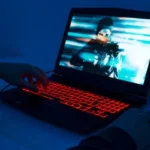Have you ever wanted to play classic video games from the past but needed consoles or cartridges to do it? If so, then emulators are your solution! But before you start, you need to know how good of a laptop do I need for emulators. Let’s break down which laptop specs are required for a good emulator experience.
For a smooth emulator experience, a mid-range laptop with a dedicated GPU should suffice, but it can vary based on the emulator and games you want to play.
Do Emulators Work On Laptops?
Emulators can work on laptops if you have the right setup. Though they may require some powerful specs, there is always a way to make them run smoothly.
Ensure that your operating system is up to date and that allocating enough RAM can be enough to get an emulator running well. Additionally, using an external GPU can be incredibly helpful for improving the performance of many emulators for laptop users on the go.
Also Read: Why Is My Gaming Laptop Fan So Loud?
Do You Need A Good Pc For an Emulator?
The short answer is yes; a good personal computer (PC) is essential for reliable and enjoyable emulator gameplay. You’ll need a PC with adequate CPU processing power and RAM to get the most out of an emulator.
Additionally, it pays to have a dedicated graphics card that can render all the (often intense) visuals. As well as enough storage or online space to hold some hefty game files.
While there may be certain exceptions depending on the type and availability of emulators, having a powerful gaming PC is the best foundation for your emulation experience.
Also Read: How Long Do Gaming Laptop Fans Last?
How Good Of A Laptop Do I Need For Emulators?

Minimum System Requirements
The minimum system requirements vary depending on the type of game you’re trying to emulate. Generally speaking. However, most emulators will run on any reasonably modern computer with at least 4GB of RAM and a dual-core processor.
For example, if you want to play eight and 16-bit games like Super Nintendo or Sega Genesis titles. Then all you’ll need is an Intel Core i3 or AMD Ryzen 3 processor running at 2.4GHz or better. Some newer emulators may require more powerful hardware for optimal performance.
Graphics Card
While not essential, having a dedicated graphics card can reduce the load on your CPU and improve overall performance. This is especially important if you try to emulate 3D games from systems like the Nintendo 64 or PlayStation 1.
As far as graphics cards go, any Nvidia GeForce GTX 1060 or higher should be more than enough for most emulation tasks. If you want even better performance and support for other features like anti-aliasing. Then we recommend going with an RTX 2060 or higher card instead.
Storage Space
Finally, depending on the type of game and size of the ROM file (the file that contains the actual game data) that you’re trying to emulate, storage space may also be an important factor in choosing a laptop.
For most classic games from systems like NES and SNES, a 256GB SSD should be more than enough storage space since these ROM files typically range from 1MB to 10MB each.
However, if you’re looking to emulate larger 3D games. Such as those found on PlayStation 1 or Nintendo 64 consoles. Then a 512GB SSD (or larger) is recommended as these ROM files typically range from 100MB to 500MB each.
Also Read: How Do Open A Laptop For A Zoom Meeting?
How Much Ram Does Emulator Take?
Knowing how much RAM an emulator might take is important because you want a system that can handle the extra load an emulator can put on it. That’s why people often ask how much RAM does emulator take.
Generally, most emulators require about 4GB of RAM to run smoothly. However, if you have more complex emulations, such as console games requiring additional processing power, you may need even more RAM.
As a rule of thumb, it’s best always to double the required memory when estimating to ensure smooth operations and eliminate hitches caused by low RAM. Proper performance is ultimately up to your PC setup and the complexity of what you’re trying to emulate.
Also Read: How To Make Gaming Laptop Fans Quieter?
Do Emulators Slow Pc?
Emulators have been a popular way to relive old classics or enjoy retro gaming on PC. But many people need to learn just how much of an impact these emulators can have on their computers.
Depending on the game you are playing and the resources your computer has available, running an emulator can slow down your machine and decrease its performance. Even powerful PCs can suffer drastically reduced speeds and should be monitored when using emulators to ensure they don’t become overloaded and crash.
Ultimately, if you want to relive those classic games without hindering your computer’s performance, then you may opt for a dedicated emulator console or invest in better performance parts for your system.
Also Read: Why Does The Fan On My Laptop Keep Running?
Bottom Line:
So how good of a laptop do I need for emulators? Emulation is a great way to experience classic video games from yesteryear without purchasing expensive original hardware and cartridges—but it requires some specific hardware specs to run optimally.
At a minimum, most emulators will run on laptops with 4GB of RAM and dual-core processors. However, dedicated graphics cards can help improve performance when playing 3D games, and sufficient storage space is required for larger ROM files (such as those found in Nintendo 64/Playstation 1 titles). With this information in mind, finding the right laptop for your emulation needs shouldn’t be too difficult!



